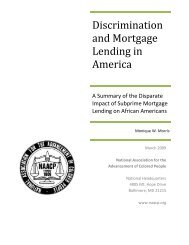TOOLKIT
TOOLKIT
TOOLKIT
You also want an ePaper? Increase the reach of your titles
YUMPU automatically turns print PDFs into web optimized ePapers that Google loves.
o<br />
How did the Legislator or staff person respond to the group? Noncommittal,<br />
bored, interested, hostile, encouraging, defensive,<br />
uncomfortable? How can you tell? (Body language? Words? Tone of<br />
voice? Short meeting?)<br />
WHAT DID YOU LEARN?<br />
o<br />
What did you learn about the legislator? Any insights into their "world<br />
view," motivation to be in politics, feelings about your issues, feelings<br />
about you as constituents, reliance on staff for information, or methods for<br />
handling meetings with constituents? (If you met with staff, did she/he<br />
give you insights about the legislator? Did staff tell you about the<br />
legislator's views or voting behavior?)<br />
NEXT STEPS<br />
o What should the next step be? (Letters? Media? Another visit?)<br />
o Who will send a follow-up letter to the legislator or staff to thank them for<br />
the meeting and restate key points?<br />
STEP 5: FOLLOW-UP<br />
1. Write a letter to the legislator or staff person, thanking them for the meeting,<br />
briefly restating key points and reminding them of commitments they made.<br />
2. If you promised to do something, do it. It's important to your credibility.<br />
3. Report on the visit to your organization, congregation, or other interested group.<br />
Ask people to write a letter (mentioning that you briefed them). Bring paper,<br />
envelopes, stamps, and pens.<br />
70 | P a g e








